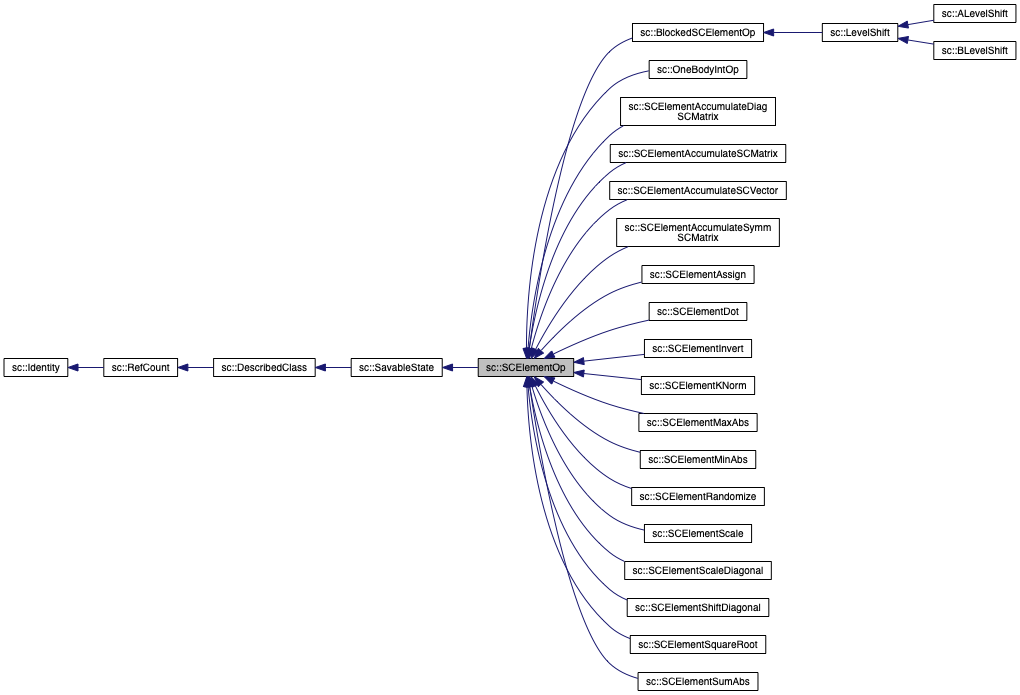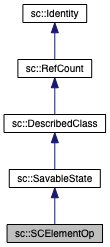Objects of class SCElementOp are used to perform operations on the elements of matrices. More...
#include <elemop.h>


Public Member Functions | |
| SCElementOp (StateIn &s) | |
| virtual int | has_collect () |
| If duplicates of the SCElementOp exist (that is, there is more than one node), then if has_collect returns nonzero then collect is called with a MessageGrp reference after all of the blocks have been processed. More... | |
| virtual void | defer_collect (int) |
| virtual void | collect (const Ref< MessageGrp > &) |
| virtual void | collect (const Ref< SCElementOp > &) |
| Multithreaded use of cloneable SCElementOp objects requires that data from cloned objects be collected. More... | |
| virtual int | has_side_effects () |
| By default this returns nonzero. More... | |
| virtual bool | threadsafe () |
| Returns true if this SCElementOp is threadsafe. More... | |
| virtual bool | cloneable () |
| Returns true if this SCElementOp supports the cloneable member. More... | |
| virtual Ref< SCElementOp > | clone () |
| Returns a clone of this object. More... | |
| virtual void | process (SCMatrixBlockIter &)=0 |
| This is the fallback routine to process blocks and is called by process_spec members that are not overridden. | |
| void | process_base (SCMatrixBlock *block) |
| Lazy matrix implementors can call this member when the type of block specialization is unknown. More... | |
| virtual void | process_spec_rect (SCMatrixRectBlock *) |
| Matrices should call these members when the type of block is known. More... | |
| virtual void | process_spec_ltri (SCMatrixLTriBlock *) |
| virtual void | process_spec_diag (SCMatrixDiagBlock *) |
| virtual void | process_spec_vsimp (SCVectorSimpleBlock *) |
| virtual void | process_spec_rectsub (SCMatrixRectSubBlock *) |
| virtual void | process_spec_ltrisub (SCMatrixLTriSubBlock *) |
| virtual void | process_spec_diagsub (SCMatrixDiagSubBlock *) |
| virtual void | process_spec_vsimpsub (SCVectorSimpleSubBlock *) |
 Public Member Functions inherited from sc::SavableState Public Member Functions inherited from sc::SavableState | |
| SavableState & | operator= (const SavableState &) |
| void | save_state (StateOut &) |
| Save the state of the object as specified by the StateOut object. More... | |
| void | save_object_state (StateOut &) |
| This can be used for saving state when the exact type of the object is known for both the save and the restore. More... | |
| virtual void | save_vbase_state (StateOut &) |
| Save the virtual bases for the object. More... | |
| virtual void | save_data_state (StateOut &) |
| Save the base classes (with save_data_state) and the members in the same order that the StateIn CTOR initializes them. More... | |
 Public Member Functions inherited from sc::DescribedClass Public Member Functions inherited from sc::DescribedClass | |
| DescribedClass (const DescribedClass &) | |
| DescribedClass & | operator= (const DescribedClass &) |
| ClassDesc * | class_desc () const throw () |
| This returns the unique pointer to the ClassDesc corresponding to the given type_info object. More... | |
| const char * | class_name () const |
| Return the name of the object's exact type. | |
| int | class_version () const |
| Return the version of the class. | |
| virtual void | print (std::ostream &=ExEnv::out0()) const |
| Print the object. | |
 Public Member Functions inherited from sc::RefCount Public Member Functions inherited from sc::RefCount | |
| int | lock_ptr () const |
| Lock this object. | |
| int | unlock_ptr () const |
| Unlock this object. | |
| void | use_locks (bool inVal) |
| start and stop using locks on this object | |
| refcount_t | nreference () const |
| Return the reference count. | |
| refcount_t | reference () |
| Increment the reference count and return the new count. | |
| refcount_t | dereference () |
| Decrement the reference count and return the new count. | |
| int | managed () const |
| void | unmanage () |
| Turn off the reference counting mechanism for this object. More... | |
| int | managed () const |
| Return 1 if the object is managed. Otherwise return 0. | |
 Public Member Functions inherited from sc::Identity Public Member Functions inherited from sc::Identity | |
| Identifier | identifier () |
| Return the Identifier for this argument. More... | |
Additional Inherited Members | |
 Static Public Member Functions inherited from sc::SavableState Static Public Member Functions inherited from sc::SavableState | |
| static void | save_state (SavableState *s, StateOut &) |
| static SavableState * | restore_state (StateIn &si) |
| Restores objects saved with save_state. More... | |
| static SavableState * | key_restore_state (StateIn &si, const char *keyword) |
| Like restore_state, but keyword is used to override values while restoring. | |
| static SavableState * | dir_restore_state (StateIn &si, const char *objectname, const char *keyword=0) |
 Protected Member Functions inherited from sc::SavableState Protected Member Functions inherited from sc::SavableState | |
| SavableState (const SavableState &) | |
| SavableState (StateIn &) | |
| Each derived class StateIn CTOR handles the restore corresponding to calling save_object_state, save_vbase_state, and save_data_state listed above. More... | |
 Protected Member Functions inherited from sc::RefCount Protected Member Functions inherited from sc::RefCount | |
| RefCount (const RefCount &) | |
| RefCount & | operator= (const RefCount &) |
Detailed Description
Objects of class SCElementOp are used to perform operations on the elements of matrices.
When the SCElementOp object is given to the element_op member of a matrix, each block the matrix is passed to one of the process, process_base, or process_base members.
Member Function Documentation
◆ clone()
|
virtual |
Returns a clone of this object.
This is needed for multithreaded use of SCElementOp objects that are not thread safe. The default implemenation throws an exception.
Reimplemented in sc::OneBodyIntOp.
◆ cloneable()
|
virtual |
Returns true if this SCElementOp supports the cloneable member.
The default implmentation returns false.
Reimplemented in sc::OneBodyIntOp.
◆ collect()
|
virtual |
Multithreaded use of cloneable SCElementOp objects requires that data from cloned objects be collected.
The default implementation will throw an exception.
Reimplemented in sc::SCElementKNorm, sc::SCElementSumAbs, sc::SCElementMinAbs, sc::SCElementMaxAbs, and sc::SCElementInvert.
◆ has_collect()
|
virtual |
If duplicates of the SCElementOp exist (that is, there is more than one node), then if has_collect returns nonzero then collect is called with a MessageGrp reference after all of the blocks have been processed.
The default return value of has_collect is 0 and collect's default action is do nothing. If defer_collect member is called with nonzero, collect will do nothing (this is only used by the blocked matrices).
Reimplemented in sc::SCElementKNorm, sc::SCElementSumAbs, sc::SCElementMinAbs, sc::SCElementMaxAbs, and sc::SCElementInvert.
◆ has_side_effects()
|
virtual |
By default this returns nonzero.
If the ElementOp specialization will change any elements of the matrix, then this must be overridden to return nonzero.
Reimplemented in sc::SCElementAccumulateSCVector, sc::SCElementAccumulateDiagSCMatrix, sc::SCElementAccumulateSymmSCMatrix, sc::SCElementAccumulateSCMatrix, sc::SCElementDot, sc::OneBodyIntOp, sc::SCElementShiftDiagonal, sc::SCElementScaleDiagonal, sc::SCElementInvert, sc::SCElementSquareRoot, sc::SCElementAssign, sc::SCElementRandomize, sc::SCElementScale, and sc::LevelShift.
◆ process_base()
| void sc::SCElementOp::process_base | ( | SCMatrixBlock * | block | ) |
Lazy matrix implementors can call this member when the type of block specialization is unknown.
However, this will attempt to dynamic_cast block to a block specialization and will thus be less efficient.
◆ process_spec_rect()
|
virtual |
Matrices should call these members when the type of block is known.
ElementOp specializations should override these when efficiency is important, since these give the most efficient access to the elements of the block.
Reimplemented in sc::OneBodyIntOp.
◆ threadsafe()
|
virtual |
Returns true if this SCElementOp is threadsafe.
The default implementation returns false.
The documentation for this class was generated from the following file: